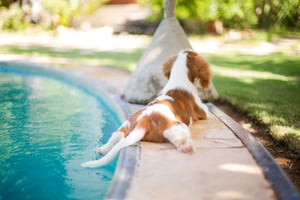Potty training a puppy can be a daunting task for any pet owner. But with the right tools and...
The Best Way to Get Your Puppy to Stop Biting
Training your puppy can be a daunting task, especially when it comes to managing their biting behaviour. Fortunately, there are a few simple strategies that you can use to help your pup understand what is and isn't acceptable. This article will provide you with the best ways to get your puppy to stop biting, so you can enjoy the company of your furry friend without worrying about getting bitten.
Understand Your Puppy's Biting Habits
The first step to addressing your puppy's biting is to understand why they are doing it. Puppies bite for a variety of reasons, including play, teething, fear, and excitement. Knowing why your puppy is biting can help you to create an effective training plan and manage their behaviour more effectively.
It's important to note that puppies may also bite out of boredom. If your puppy is not getting enough exercise or mental stimulation, they may resort to biting as a way to entertain themselves. To prevent this, make sure that your pup is getting plenty of exercise and stimulating activities throughout the day.
Use Positive Reinforcement
Positive reinforcement is one of the most effective ways to train your puppy not to bite. When your puppy is not biting, reward them with treats and verbal praise. This will help to reinforce their good behaviour and encourage them to repeat it.
It's important to be consistent with your rewards, as this will help your puppy to understand that they are being praised for not biting. However, it's also important to not overdo it with the treats, as this can cause your puppy to become reliant on them. Instead, use a combination of treats and verbal praise when rewarding your pup.
Redirect Your Puppy's Attention
If your puppy is getting too excited and starts to bite, redirect their attention to a toy or another activity. This will help to distract them from biting and keep them occupied. Toys that are designed for puppies are a great way to keep your pup entertained, as they are designed to be both stimulating and safe for them to play with.
If your puppy is teething, it's a good idea to provide them with chew toys. This will help to relieve the pain of teething and prevent them from biting other objects in the house. Make sure to provide your pup with plenty of chew toys so that they have plenty of options when they start to feel the urge to chew.
Teach Your Puppy Bite Inhibition
Teaching your puppy bite inhibition is a great way to get them to stop biting. Bite inhibition is the process of teaching your puppy to control the force of their bite. This can be done by teaching your pup to understand the difference between gentle and hard biting.
When your puppy is biting, give a loud yelp or say "ouch!" This will help your pup to understand that biting too hard is not acceptable. You can also give your puppy a toy or a chew bone to redirect their attention away from biting. With consistent training, your pup will soon learn how to control the force of their bite.
Be Patient and Consistent
Training a puppy can take time and patience. It's important to remember that your pup is still learning and that they may not understand the rules right away. Be patient with your pup and give them time to learn and adjust to the new rules.
It's also important to be consistent with your training. Your pup will learn more quickly if they understand what is expected of them. Make sure to use the same commands and rewards each time you train your pup, and be consistent in your expectations. With consistent training, your pup will soon understand the rules and be able to stop biting.
Conclusion
Getting your puppy to stop biting can be a challenging task. However, with patience, consistency, and positive reinforcement, you can help your pup understand what is and isn't acceptable. Understanding your pup's biting habits and using positive reinforcement, redirecting their attention, and teaching them bite inhibition are all great ways to get your puppy to stop biting.
By following these tips and being patient with your pup, you can help them learn how to behave properly and enjoy the company of your furry friend without worrying about getting bitten.



